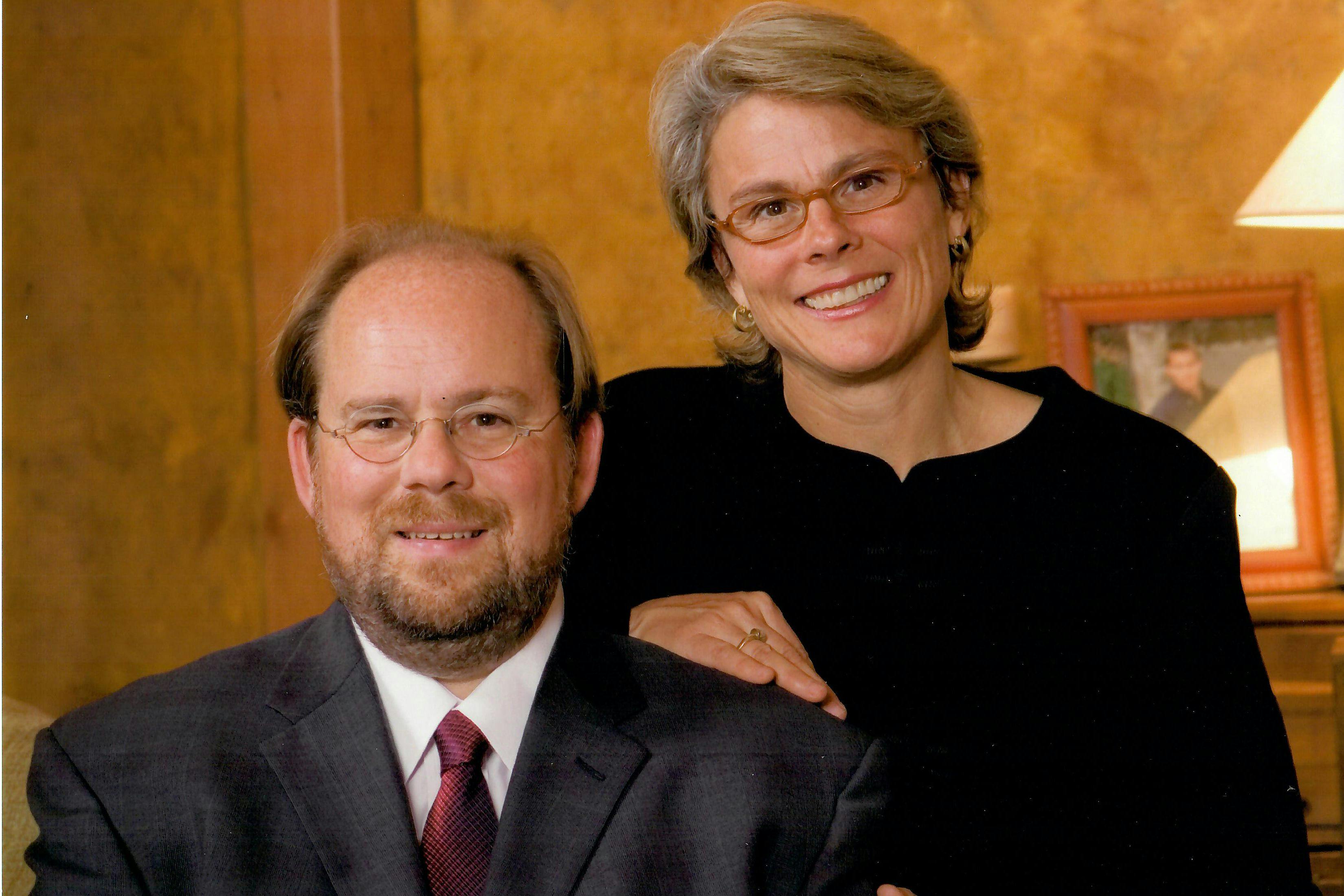News
Gift of Science Instruments Elevates Bethel’s Research Capabilities
January 31, 2018 | 3 p.m.
By Monique Kleinhuizen ’08, GS’16, new media strategist

Fluorescence microscopy is one method of analyzing cells (like the ones shown), but it’s subjective and time-consuming. Flow cytometry—now used in Bethel’s labs—counts thousands of cells in seconds, assigning an exact numerical fluorescence value per cell.
“This is my blood! Isn’t that cool?” says Associate Professor of Chemistry Angela Stoeckman ’97, her eyes lighting up like the fluorescent blobs of bright blue and green cells on her computer monitor.
Stoeckman explains the research she’s done with chemistry and biochemistry students over the past year. Though subjects run the gamut from tobacco leaves to liver cells, her projects have one thing in common: They wouldn’t have been possible without a substantial gift in kind by thoracic and cardiac surgeon, professor of surgery, and 2004 Alumnus of the Year Robert Love ’78 and his wife, Phoebe ’79.
In 2015, the longtime Bethel supporters and former Bethel parents gifted a Beckman Coulter Counter, Partec flow cytometer, and autoMACS Pro Cell Separator to Bethel’s science departments. The state-of-the-art instruments are among only a handful of their caliber in the Twin Cities undergraduate science community, giving Stoeckman and her colleagues and students an incredible edge in research and hands-on learning.

Dr. Robert ’78 and Phoebe Love ’79, the donors behind a transformative gift of specialized science instruments in 2015.
Robert Love, professor of surgery at Northwestern University in Chicago, observes that “Bethel’s sciences are now able to support research that’s much more sophisticated,” but says his intent in choosing to gift the instruments to Bethel was far-reaching. “I’m very interested in having Bethel remain relevant in the public forum. And I’m hoping that these gifts will allow more science students at Bethel to have a deeper knowledge of creation and choose to go into the hard sciences and medicine.”
Their use on Bethel’s campus has already been extensive and varied since the instruments were installed in 2015. For example, Katerina Estrada ’17 developed a study using flow cytometry for her required biochemistry research project, with funding from the Sigma Zeta Honor Society. She and Stoeckman used a special dye that binds to neutral fats, “lighting up” lipids in hopes of better understanding how the liver stores them and whether blood cells demonstrate the same diagnostic characteristics as liver cells. It could impact how doctors diagnose non-alcoholic fatty liver disease (NAFLD), which impacts one in three Americans, explains Stoeckman.
“The problem with looking at a sample like this under a microscope,” Stoeckman continues, “is that it’s so subjective. I’m saying, ‘Oh, that section looks good,’ and ‘It looks like that part has fewer droplets than this other part.’ Your liver sample now gets sucked up into the flow cytometer and each cell—in a tube of millions—is forced single-file past a laser, which can read out how much fluorescence there is, numerically.”
The flow cytometer can study 250,000 cells in a minute, giving students a more rapid and accurate assessment of cells and allowing them to ask bigger questions about the implications of their work. “Could we use this technique to do a quick and dirty diagnosis of NAFLD? And could I do the same thing with a blood sample that I’ve been able to do with a liver sample?” Stoeckman asks.
“The future of diagnosis and treatment of disease will be blood-based genetic and biochemical analysis, or ‘liquid biopsy.’ These instruments allow students and faculty to probe questions at that level,” adds Love. His own lab has specialized in organ preservation, using personalized medicine and the detection of cell death byproducts to measure and prolong the ability to be able to transplant an organ. Love knows firsthand the way research like this can directly impact lives and transform medical practice.
Bobbi Livengood ’17 was a biology major with a minor in chemistry. She graduated in December, begins medical school in the fall, and says her undergraduate research set her up for success in internships and landed her the opportunity to present at the Autumn Immunology Conference in Chicago, which is rare for an undergraduate student.
One of her biology professors, Joyce Doan, has led significant student research on the largely unknown effects of essential oils and other natural products on ailments, including myelomonocytic tumor cells. Livengood worked with Doan to assess the mechanism in which resveratrol—a natural phenol produced when plants are under attack—inhibits the activation of macrophage cells.
“I started looking into whether resveratrol simply shut down macrophages or caused them to undergo apoptosis, a form of cell death that does not induce inflammation. Cell density, as determined by the Coulter Counter, set the foundation for each of my experiments—as it allowed me to scale the reagents I used to fit the cell populations of each condition, as well as see the decrease in the population with increased resveratrol concentration,” Livengood says. “Through flow cytometry, I was able to detect an increase in a cell surface marker, phosphatidylserine, that was indicative of apoptosis for the conditions treated with resveratrol.
“I found that stimulated cells had altered cell cycle progression, providing evidence that resveratrol stimulation likely damaged the DNA and therefore induced apoptosis through an intrinsic pathway,” Livengood continues, explaining that the substance induces apoptosis, and emphasizing the importance of identifying the proper dosage when using it as a supplement. “The research I’ve conducted at Bethel has opened so many doors of opportunity.”
As Love looks back on his own time as a Bethel student, he’s impressed by the increasing sophistication of the university’s science departments. “It’s just a completely different world there now—there are so many strong science programs,” he says.
To discuss gifts in kind—or opportunities to support Bethel’s science programs like the Loves have—contact the Office of Development.